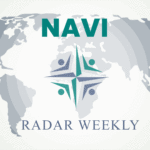Subscribe to NAVI Radar Weekly here
Focus Point: Regional Security- Middle East
Five impacts of the Gaza war to watch | Atlantic Council
Stefanie Hausheer Ali | 03.06.2024
The latest Gaza war has resulted in horrific loss of life since October 8, 2023, and no matter how it eventually ends, the US government and companies should be paying attention to these five ripple effects:
- The reputation of the United States and US company brands have taken a major hit in the region
- Boycotts of certain US brands are occurring and will continue to flare up periodically
- Israel’s ability to bring in foreign direct investment may be diminished
- Arab states are pulling away publicly from the United States in some ways, but still desire close ties
- The potential for destabilizing regional protests and lone-wolf attacks has increased. Read more…
Focus Point: Security and Defense Policy- Great Power Competition
Instrument of order | Brookings
Bruce Jones | 03.06.2024
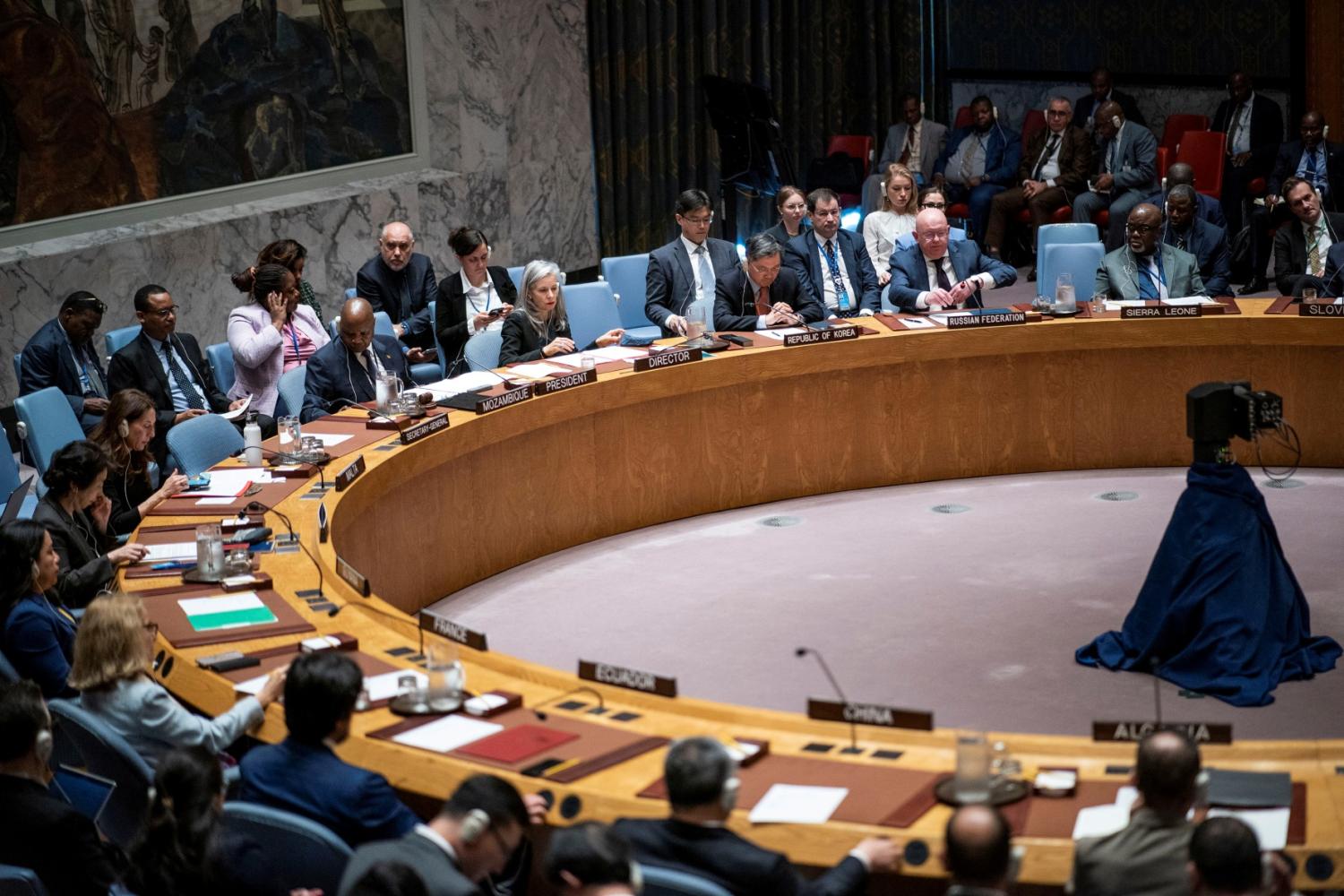
Still, given that China and Russia maintain a strong focus on the U.N. and its role in international order, and given the paucity of regional security and conflict management mechanisms in Asia, we may find that as the United States and its core allies up the ante on deterrence in Asia, they also find an increasing need for diplomatic instruments.
Neither the Association of Southeast Asian Nations nor the Shanghai Cooperation Organization nor the South Asian Association for Regional Cooperations nor the Asian Regional Forum will provide them. In Europe: If the political dynamics surrounding the Ukraine war change, we may find ourselves in need of mechanisms through which to negotiate war termination, or interim arrangements on the ground.
The Security Council as an instrument for crisis management
The challenge will be to reinvent the older sensibility of using the Security Council as an instrument for crisis management, in new theaters, with a new rival, in rapidly changing times. Whether Washington comes to this conclusion, or Beijing does, or Moscow does, remains to be seen. In the meantime, activist middle powers and the U.N. itself would do well to recall this older role, and to remind the top powers, via their own quiet diplomacy, of the quite substantial menu of arrangements for de-escalation that the Security Council can provide. Read more…
Focus Point: Regional Security- Indo-Pacific Security
How to Respond to China’s Tactics in the South China Sea |RAND
Derek Grossman| 03.06.2024

This commentary originally appeared on Foreign Policy on May 29, 2024.
As for collective action by the Association of Southeast Asian States (ASEAN) to challenge Chinese encroachments, the track record of the past nearly 30 years is not encouraging—even though several other members, including Vietnam and Malaysia, are also facing Chinese incursions into their waters. Since 1996, ASEAN has been working on a future code of conduct for the region, which might call for an end to militarization, land reclamation, and seizures of disputed features. However, this would entirely depend on the bloc’s success in negotiating the code with Beijing, which has shown no inclination to compromise on its view that it owns most of the South China Sea. Bilateral negotiations would likely founder for similar reasons.
Finally, Washington and Manila could simply stay the course. This would mean continuing to bolster the alliance through expansion of the existing defense cooperation agreement, more focused annual military exercises, and other engagements, as well as through helping Manila to build its own military capabilities and expose China’s bad behavior to the world. But none of these measures have been successful against gray-zone tactics so far, and any future success is likely to take more time as Beijing continues to eat away at Manila’s EEZ.
The best option might be to stay the course on U.S.-Philippines alliance-building but add new features, such as revising the treaty to reflect gray-zone realities, tie into the Replicator program, and impose costs for China’s behavior via other parts of the U.S.-China relationship. Doing these things now should give the Philippines the breathing room that it needs to modernize and professionalize its military with U.S. assistance, helping to reestablish deterrence and lessen the risk of war in the years to come. Read more…
Focus Point: Security and Defense Policy- Russia-Ukraine War
Vladimir Putin just tacitly admitted Crimea is not really part of Russia | Atlantic Council
Peter Dickinson| 04.06.2024
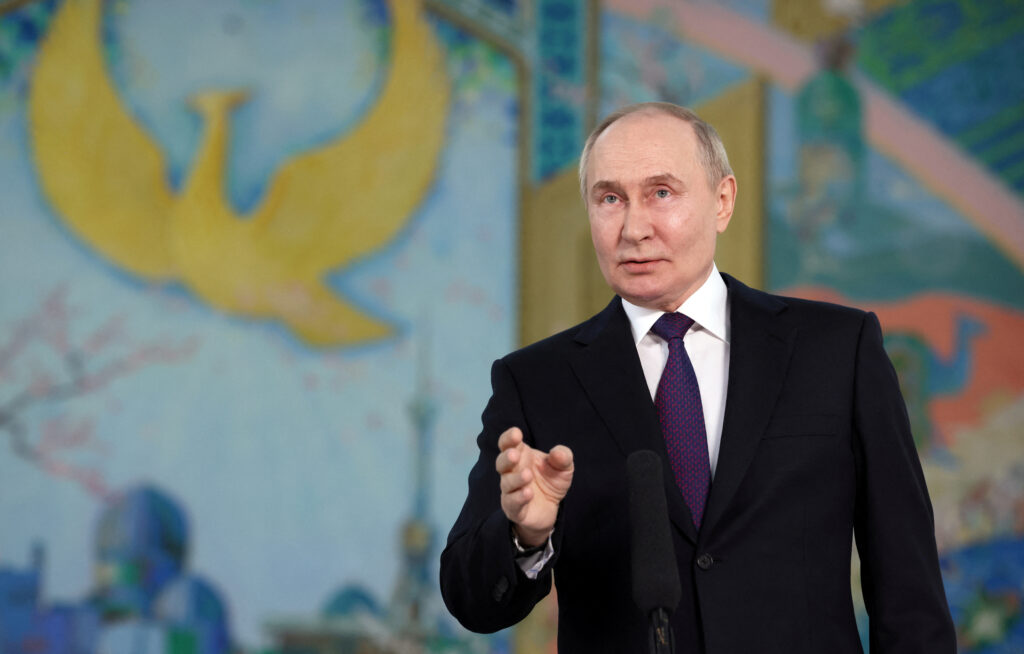
Ukraine achieved a major diplomatic breakthrough last week, securing the green light from key allies for strikes inside Russia using Western weapons. The Russian reaction to this landmark news has bordered on the hysterical, with a host of Kremlin officials and propagandists denouncing the West and vowing terrible revenge.
Predictably, Vladimir Putin led the way, issuing yet more of the thinly-veiled nuclear threats that have become his trademark. Speaking in Tashkent, Putin warned European leaders of “serious consequences,” before reminding them of their own vulnerability. “They should keep in mind that theirs are small and densely populated countries, which is a factor to reckon with before they start talking about striking deep into Russian territory,” he commented.
Close Putin ally and former Russian president Dmitry Medvedev’s response featured an even more explicit nuclear threat. Medvedev, who currently serves as deputy chairman of Russia’s Security Council, said it would be a “fatal mistake” for Western leaders to believe Russia was not ready to use nuclear weapons against Ukraine or individual NATO member states. “This is, alas, not an attempt at intimidation or a nuclear bluff,” he declared.
“small and densely populated countries,”
Russia’s use of nuclear blackmail is no longer particularly surprising, of course. Since the very first days of the Ukraine invasion, Putin has engaged in frequent bouts of nuclear saber-rattling as part of a broader Russian effort to establish so-called red lines and undermine Western support for Ukraine. Nevertheless, this latest example of nuclear bluster is worthy of closer attention as it inadvertently provides revealing insights into the political realities behind Putin’s lofty imperial rhetoric of conquest and annexation.
With his chilling references to “small and densely populated countries,” Putin clearly hoped to intimidate his opponents and signal that the use of Western weapons on Russian territory is a major red line for the Kremlin. But according to Russia’s own logic, this particular red line has already been crossed on hundreds of occasions. Since 2022, Ukraine has routinely used Western weapons throughout the occupied Ukrainian regions that Putin says are now part of Russia, without triggering any discernible escalation from Moscow. In Putin’s new Russian Empire, it would seem, some places are more Russian than others. Read more…
Focus Point: Security and Defense Policy- Emerging Threats and Global Risks
Kremlin welcomes Turkey’s reported desire to join BRICS | Reuters
Reuters| 04.06.2024
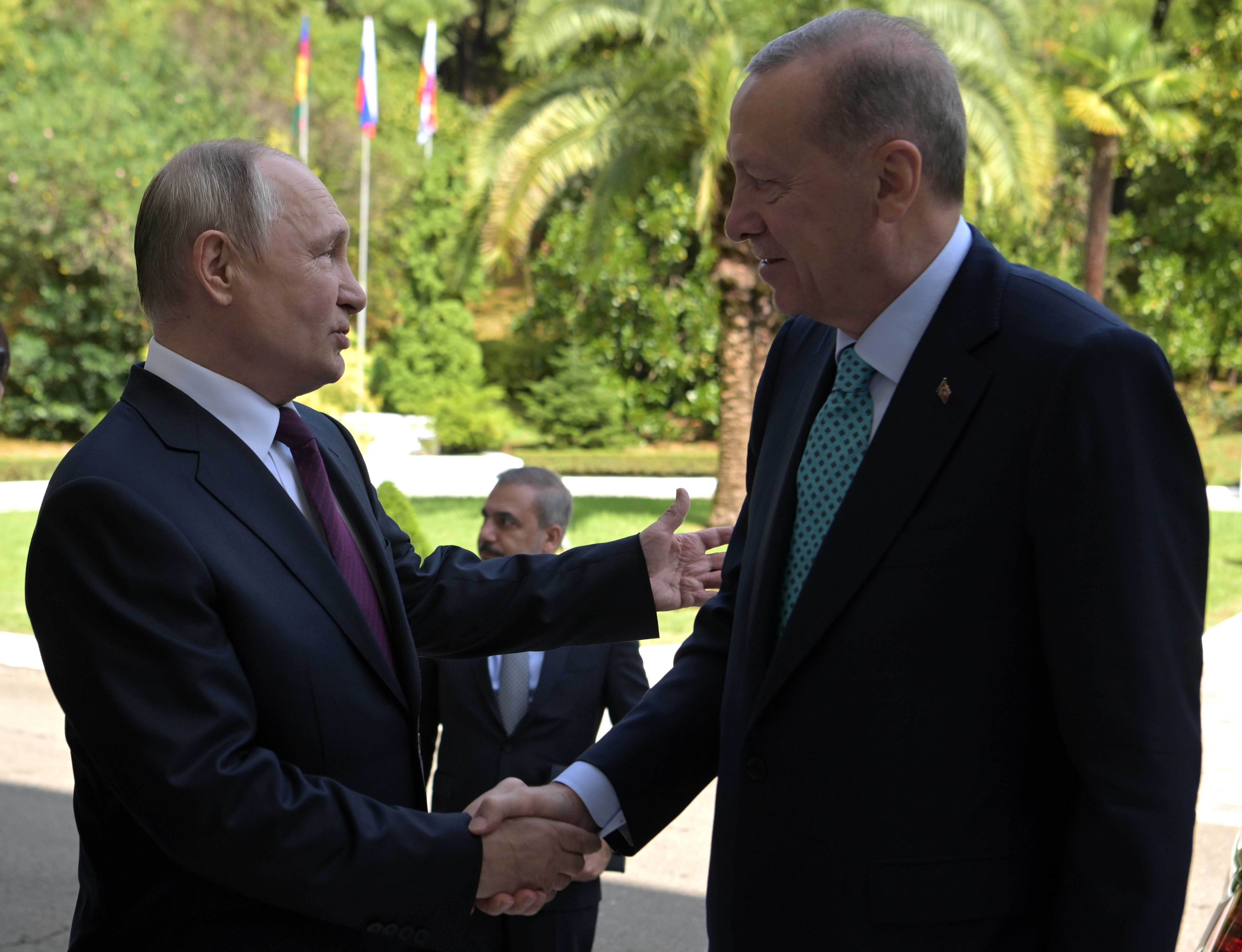
Russia welcomes Turkey’s reported desire to become part of the BRICS group of nations, Kremlin spokesman Dmitry Peskov said on Tuesday, saying the subject would be on the agenda of the organisation’s next summit.
NATO member Turkey had come under fire by its Western allies in recent years over its ties with Russia, with some saying that its “axis” was shifting away from the Western military alliance.
On Monday, Turkish Foreign Minister Hakan Fidan began a visit to Beijing, the highest-level visit by a Turkish official to BRICS member China since 2012. Fidan held talks with Chinese counterpart Wang Yi and other officials during the visit.
Asked whether Turkey would want to join BRICS during a talk at the Center for China and Globalization on Monday, Fidan said “we would like to of course, why would we not?”. However, he did not elaborate further.
NATO member Turkey had come under fire by its Western allies in recent years over its ties with Russia, with some saying that its “axis” was shifting away from the Western military alliance. Read more…
Focus Point: Security and Defense Policy- Great Power Competition
Great Power Competition: Alliances in INDOPACOM | War Room-USAWC
Ajai Dabas , Wade Smith , Matthew Taylor , Ron Granieri | 04.06.2024 | A Must Read
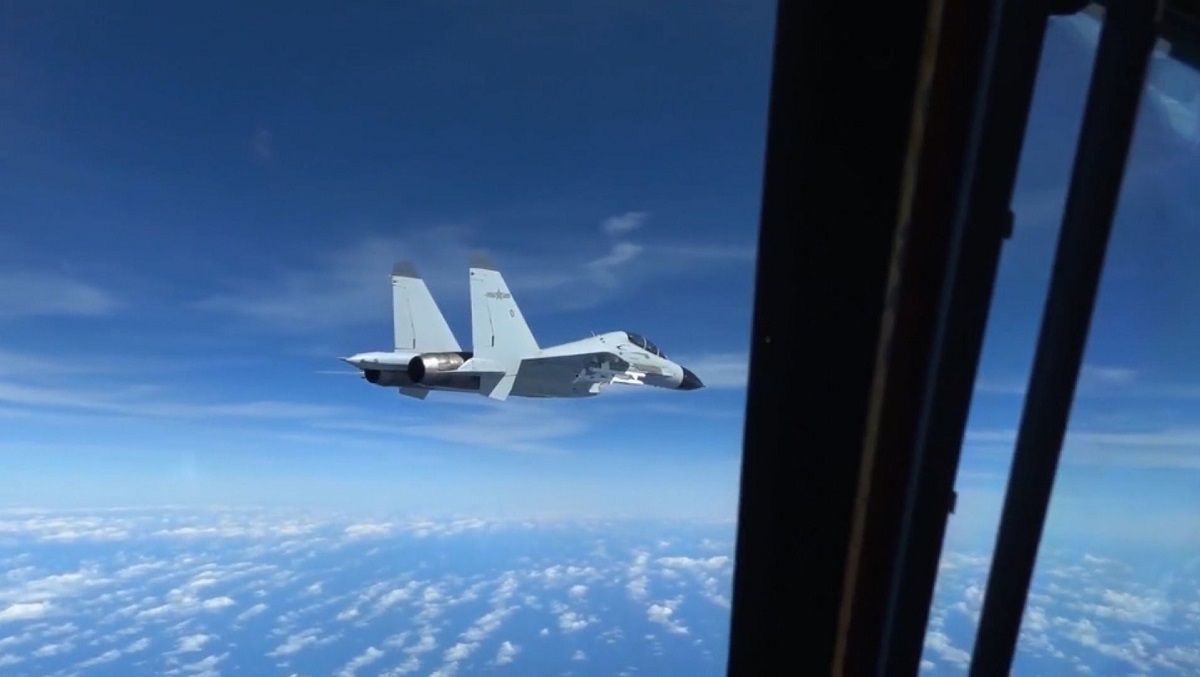
It’s time once again to feature some of the smart conversations that occur around the country through the Eisenhower Series College Program. For over 50 years, the Eisenhower Program has reached out to colleges and town halls across the nation to introduce War College students to audiences that are often unfamiliar with members of the U.S. military. This episode features Ajai Dabas, Wade Smith and Matthew Taylor discussing great power competition. They join podcast editor Ron Granieri to discuss their professional experiences, primarily in the Indo-Pacific theater. Their insights highlight not only China’s actions and motivations in the region but, more importantly, the crucial importance of alliances as well. All three guests share their thoughts on strong partnerships in INDOPACOM as the primary tool to defeat unchecked Chinese aggression and expansion.
“The problem is that the People’s Republic of China has achieved a level of military power that has allowed them to take things that don’t belong to them, knowing that their neighbors like Malaysia, Brunei, Vietnam, the Philippines do not have the power to deny them.”
Focus Point: Security and Defense Policy- Defense Discussions
A Three-Theater Defence Strategy | FA
Thomas G. Mahnken | 05.06.2024
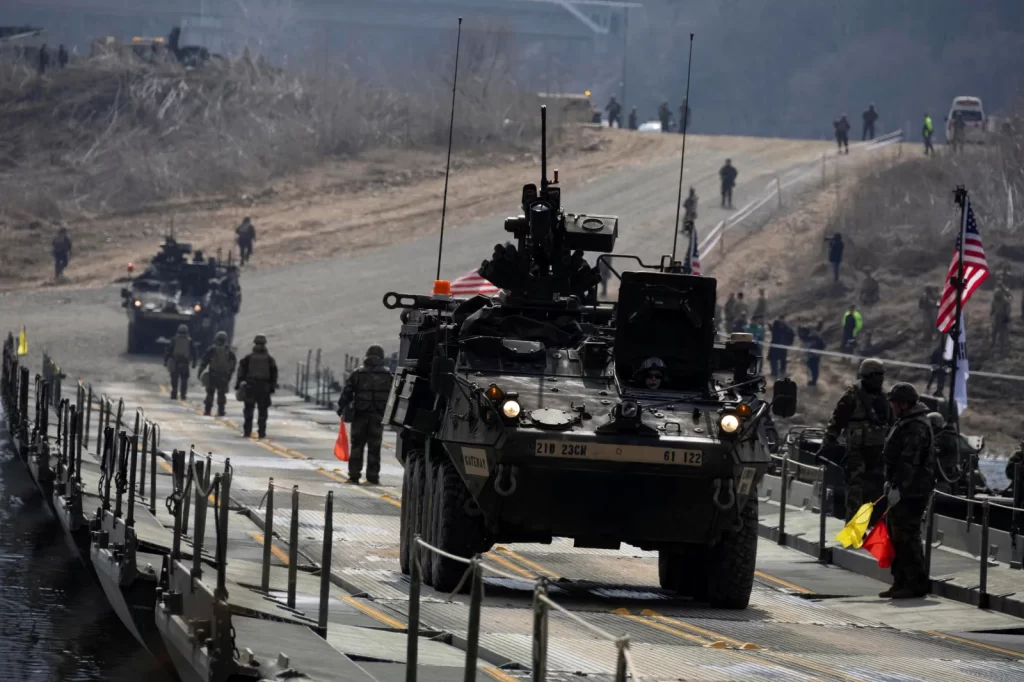
The United States is currently involved in two wars—Ukraine’s in Europe and Israel’s in the Middle East—while facing the prospect of a third over Taiwan or South Korea in East Asia. All three theaters are vital to U.S. interests, and they are all intertwined. Past efforts to deprioritize Europe and disengage from the Middle East have weakened U.S. security.
Washington is fortunate to have capable allies and friends in East Asia, Europe, and the Middle East. Collectively, they have the power to help it constrain the authoritarian axis. But to succeed, they must do a better job of working together. Washington and its allies need to be what military planners call interoperable: capable of quickly sending resources across an established system to whichever ally needs them most. Read more…
Focus Point: Emerging Technologies & Data- Artificial Intelligence
The race for AI PCs: Who’s winning and what’s at stake | Asia Nikkei
Cheng Ting-Fang and Lauly Li | 06.06.2024 |Subscription needed

Chipmakers are hailing the AI boom as the “biggest change” in a decade for personal computers and a moment of rebirth for the sluggish PC market. But the rush to capitalize on the moment is bringing new players into a segment traditionally dominated by Intel and AMD.
Ambitions for the coming era of PCs optimized for artificial intelligence were on display this week at the Computex trade show in Taipei. Read more…
Focus Point: Regional Security- Indo-Pacific Security
U.S.-Japan defense industry ties a model for other nations: Emanuel | Asia Nikkei
Ken Morıyasu| 06.06.2024 |Subscription needed

Cooperation on the development, production and maintenance of weaponry set to kick off between the U.S. and Japan can be applied to other countries, U.S. Ambassador to Japan Rahm Emanuel told Nikkei Asia in a recent telephone interview.
“No country like Japan has this much manufacturing, this much engineering, this much industrial potential that has been untapped,” U.S. Ambassador to Japan Rahm Emanuel
“No country like Japan has this much manufacturing, this much engineering, this much industrial potential that has been untapped,” Emanuel said, describing it as offering a “blueprint of what we can do with other countries.”
Asked about the possibility of the U.S., Japan and Australia in the future having the same designs for ships and planes and co-producing such assets, Emanuel said he could see such a path ahead.
He pointed to the recent coordination between Israel and the U.S. Central Command that led to the downing of 99% of the 300 or so projectiles from Iran’s mid-April attack. The U.S. trains even more closely with Indo-Pacific partners.
“Having that interoperability, having a missile system that many countries either produced together, or not only worked on but developed together … there’s a lot of ways to slice it,” he said.
Japan’s Ministry of Economy, Trade and Industry notes that an aircraft typically requires 3 million parts, while missiles need around 1 million. To maintain military superiority over adversaries such as China and Russia, the U.S. needs a robust supply chain.
With its own defense industry running at full capacity, the U.S. will tap defense contractors in Japan, and potentially other allies and partners in the Indo-Pacific. Read more…
Focus Point: Regional Security- Indo-Pacific Security
India: Ruling Coalition To Form Government, Modi’s Swearing-In Set for June 9 | RANE
RANE |07.06.2024
What Happened: India’s ruling National Democratic Alliance coalition, or NDA, officially submitted its claim to President Droupadi Murmu to form a government and nominated Narendra Modi for the premiership, The Times of India reported on June 7. This comes just days before Modi’s swearing-in ceremony on June 9, for which Indian authorities are implementing extensive security measures
Why It Matters: These steps cement the NDA’s hold on power, thwarting the opposition’s plans to form a government by poaching allies of the NDA’s leader, the Bharatiya Janata Party, or BJP, and mobilizing other partners to meet the majority threshold. In the coming days, the NDA will announce the names of ministers and assign key portfolios. Important NDA allies, including the Telugu Desam Party and the Janata Dal (United) party, have likely requested concessions such as key ministries or financial benefits for their states, and the BJP might grant these concessions to keep regional parties within the alliance. Meanwhile, Modi’s swearing-in ceremony heightens the risk of minor protests, terrorist attacks and clashes with security forces, leading to delays in employee travel and supply chain shipments.
Background: India will implement security measures — such as blocked roads, increased personnel, covert snipers, ground-to-air surveillance, and heightened security on car routes for Modi and visiting dignitaries — ahead of Modi’s swearing in. The country will also seal state borders and deploy security forces to malls, markets and monuments in the capital. Read more…
Thank you very much for reading.
The NAVI Research Institute is the research division of NATO Veterans Initiative - NAVI that provides a unique perspective to transatlantic leaders and societies on peace and security through the lens of NATO's founding principles of rule of law, democracy, human rights, and individual liberties. The NAVI Research Institute was officially established by the NAVI Board on July 16th, 2023.

![NAVI-PROJE-[Recovered] Radar Weekly](https://nato-veterans.org/wp-content/uploads/2024/05/NAVI-PROJE-Recovered-696x392.gif)
